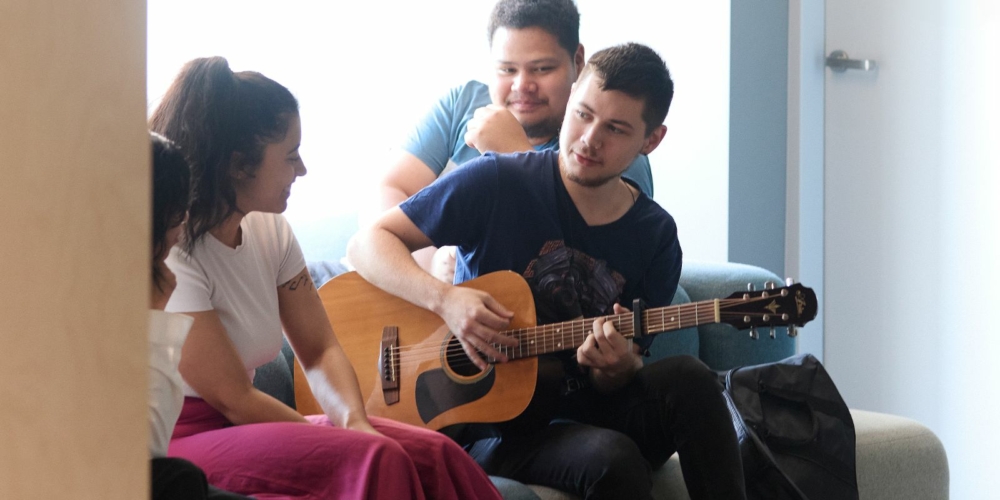How to build a successful music career as a musician in 2022 can be a challenge. However, there are clever ways to capitalise on the new opportunities available to artists. The digital world, social media’s reach and the way it can empower artists to build their own audience have revolutionalised the music industry, but this new frontier can be tricky to navigate at the best of times.
For the latest episode of AIM’s Music Industry Insights podcast, we called upon AIM lecturers (all industry experts and accomplished musicians) from a cross-section of our music departments. In this extended interview, they provide advice garnered from their years of experience on how to create a “portfolio career” – where you leverage your strongest skills and build competence in new areas to make money and sustain a career in music.
You can listen to the whole discussion on the latest episode of our Music Industry Insights podcast on Apple Podcasts or Spotify Podcasts or use the player below.
Featured speakers:
- Lauren Neko – Entertainment Management lecturer, DJ, musician
- Ken Francis – Composition and Production lecturer, musician, composer
- Julian Gough – Head of Contemporary department, musician, composer
- Adrian Bolland – Audio lecturer, engineer, producer, musician
- Nicholas Gentile – Music Theatre lecturer, composer, producer, musician
In the first article in our “Build A Successful Music Career” series, Entertainment Management lecturer, DJ and music artist Lauren Neko shares her advice for musicians.
7 Ways To Build A Successful Music Career
- Be a generalist and develop the skills you’re less good at.
- Leverage your social network and always be good to people you work with.
- Be a lifelong learner. Study formally, educate yourself online and on the job.
- Say yes to all opportunities early in your career.
- If you can’t do a particular job, recommend a replacement.
- Know your strengths and invest in developing your weaknesses.
- Know how to set up a business properly.
If you work in artist management (or manage yourself), you have to be a generalist.
I would honestly say that my career has been a continuous upskilling and broadening of my skills. I am an electronic music artist, I’m a vocalist, producer and DJ. And I still spend most of my weekends gigging and have a couple of days a week where I produce on top of my lecturing.
Be a lifelong learner.
I studied my Masters in Arts and Entertainment Management at AIM. Prior to that, I did a diploma in music, a diploma in jazz, and also a diploma of sound engineering. I based my approach on: ‘I want to do this, I’m going to go study it.’ When I had done it for a while, I thought ‘I need to be able to record this, so I better go study it.’ As soon as you lean into learning, the benefit is that you will believe in yourself. And you will have more success just from believing in yourself.
Educating our students on how to thrive in the new music industry is core to what we do at AIM. Explore AIM’s performance, production, composition and business courses here.
The networks that you build while you are at uni are vital to the opportunities that you have later on.
Doing the Master of Arts and Entertainment Management degree was really amazing for the knowledge, but it was the networks and the people who have co-created opportunities for each other that were also very valuable. And even second, third, fourth level connections will come to me for work because of those people. So the relationships that you nurture whilst you’re at uni – whether it’s with staff and lecturers or the people in your class – are so vital to your success. If you really invest in them, you’ll get a lot out of it.
Say yes to everything early in your career.
You need to say yes to everything and get that experience under your belt. Be the ‘yes person,’ be the person that people can go to. Just give it a shot because you’re showing people that you’re ready to show up. There comes a time where you know that you can do everything, but you can’t do everything at once. That’s when you start to build your niche and you start to focus. That’s when your career gets really interesting, because you get to do what you like.
If you can’t do a particular job, recommend a replacement.
Don’t be a closed door for someone – be an open door or corridor. People will associate you with someone who is really busy and as valuable, or someone who helps continue opportunities for them. So even if it’s not now, it’s not no. And that is another way of continuing goodwill, which in an industry where people talk, is very important. It’s always nice to be known as someone who continues to open doors for people.
Know your strengths, and your weaknesses.
You need to be prepared to be bad at a few things as well as getting good at stuff. That’s the whole idea of being a generalist. Particularly when you start off, you have to diversify, you have to know all the things but you also have to know ‘I am definitely not great at that, I’m going to pay someone else to do that.’ Or I’m going to make that someone else’s responsibility. And that’s a skill – knowing what you’re not good at.
Know how to set up a business properly.
A lot of musicians are daunted by signing up for an ABN. It takes five minutes! Spend an hour on the government business websites, you’ll be fine. It’s really funny, but we’re so daunted by things we’re not familiar with. As any kind of creative person, everything that you do will always have some level of discomfort before you’re good at it. Sometimes it’s the business side, sometimes it’s, ‘I’m a really good musician. Why do I suck at songwriting?’ Whatever it is, you have to focus on what you suck at. To reach that next level, you will only get so far by focusing on what you’re already good at.




